Duplicate content is a problem that can keep your website from getting the higher rankings that it otherwise would. This is a no brainier. Anyone who knows how to optimize websites knows this, and we build our information architecture in a way that insures our product pages don’t appear on different URLs. If they do, we know how to canonicalize the more important version. With the different methods that we can employ to prevent an eCommerce website from duplicating its own content, plenty of seasoned and competent webmasters are still using boilerplate copy on their product pages.
Boilerplate Copy and Product Descriptions
Boilerplate copy is the paragraph or so of text, usually provided by the manufacturer or distributor, that can be used over and over again to describe the products that retailers are selling. These pre-written product descriptions are a major time-saver to eCommerce webmasters, particularly if they have thousands upon thousands of products in their catalog. Many retail websites get descriptions for their products directly from a third-party product feeds and other sources that share the same content with hundreds, or thousands of other websites.
But competitor X uses the same boilerplate copy as I do and they outrank me by miles! Why don’t they get a duplicate content penalty?
First of all, your website will not be penalized for using boilerplate content. If you have a bunch of duplicate content across a bunch of domains that is clearly intended to manipulate search rankings, then yes…you will be penalized. Beyond that, Google wants to do it’s best to show only unique documents in their search results. In order to do this efficiently, duplicate versions are filtered out and Google attempts to serve the document hosted by the strongest website.
While you’re not being penalized, you are not really giving search engines any content that sets you apart from anyone else who uses the same text. If content is king then why would you let someone force search engines to choose some other way to rank and index your pages?
When Google finds two nearly identical pages on the Web, it will pick the one with higher PageRank to serve in its results. According to a paper published by Google researchers Daniel Peng and Frank Dabek, even inbound links will be forwarded from the lower ranking page to the highest ranking one. The paper this was published in is called Large-scale Incremental Processing Using Distributed Transactions and Notifications, from 2010, and it is every bit as action-packed as the title would have you believe.
Here’s an interesting example… While researching this post, I went around and asked my coworkers to name a product they use every day. One of our link building managers suggested face-wash, and I randomly chose Neutrogena® Fresh Foaming Cleanser. The only duplicate copy on the first page of results is shared by drugstore.com (ranking second after the manufacturer) and amazon.com, which ranks fourth after a Google Image Search seven-pack.
There is one pair of page-1 results that use the same copy
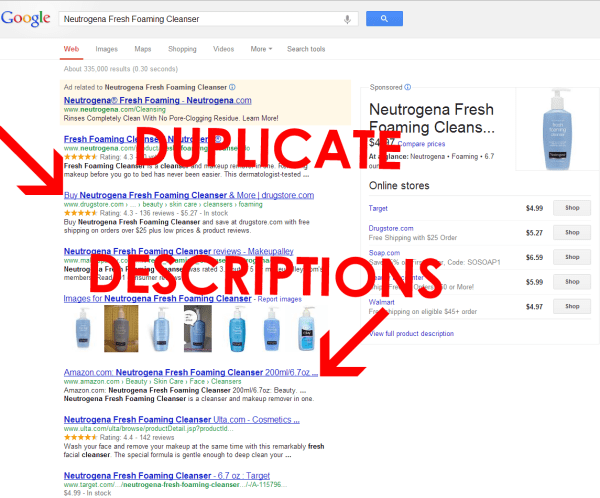
Without even looking, I think we can agree that Amazon has a far better domain authority (DA 100) than Drugstore.com (DA 86). It appears that Drugstore.com has a leg-up Amazon in URL-level metrics. Page Authority is a little bit higher than Amazon, and their Trust & Citation Flow are significantly higher. Furthermore Drugstore.com has better mozTrust and mozRank. This tells me that it most likely has has a stronger and more diverse link profile, while Amazon has garbage.
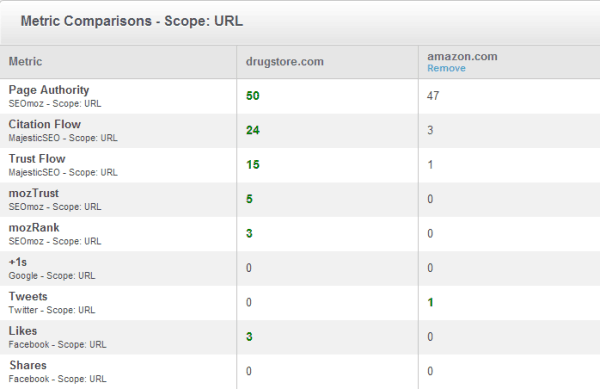
If you’re having trouble figuring out why your competitor’s pages are ranking for a particular search, when they have the same text content as you do, this is one of the biggest factors to consider. When the text is the same from website to website, Google has to choose factors besides content to decide where to rank your pages.
…and it’s not just bad for search engine rankings.
You sell your products to people who have, in many cases, hundreds or thousands of your competitors to choose from. It is far easier for your business to achieve success when you set yourself apart from your competitors.
Navigate to a popular manufacturer’s web page, choose a product, and copy the product description. Paste the text into Google and see how many websites use the exact same words. In the case of this Sony Alpha a37 SLT-A37K DSLR camera, Google found over 42,000 pages that use the same text as the features paragraph from store.sony.com. You also see that Sony’s own store ranks #2 instead of #1.
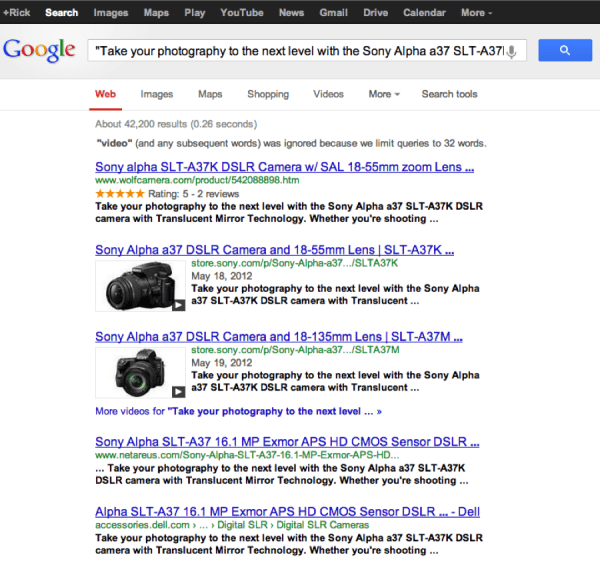
Ok, so what? Your customer isn’t typing boilerplate text into a search engine, so this doesn’t mean much, right? Try querying just the product name, without quotes, the same way that your customer might. In this example, I queried Sony Alpha a37 SLT-A37K DSLR camera with Translucent Mirror Technology.
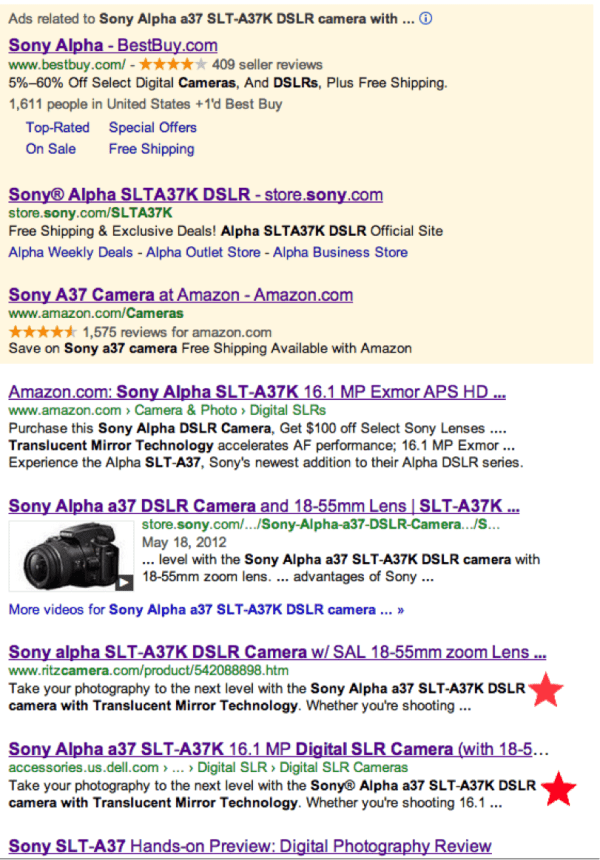
Six out of the ten-page #1 results are retail websites. Five of them have pretty much the same pricing, although one was about $100 higher. Ritz Camera and Dell both use the manufacturer’s copy in their meta descriptions. Only Dell uses the boilerplate text in the body of the page. All of the other pages, besides store.sony.com, appear to use unique, descriptive content that is useful and tries to guide users into making a purchasing decision. In addition, there are glossaries, consumer reviews, shipping deals, special promotions and other content that is unique to each specific website.
The Bottom Line
The most successful eCommerce websites use their pages to entice, engage and inform shoppers. Besides just describing products, they offer their visitors authority, trust, and attempt express to users why their website is the best one to buy from. Search around a little bit more and you will see that even top-ranking websites that use boilerplate copy also use original and useful content that ranks well, attracts links naturally and converts shoppers.
Using original content is necessary to get the most value out of your eCommerce website’s category and product pages. Google considers duplicate content to be a bad user experience and will try its best to filter out all documents but the one on the website it considers to be the most important. Creating unique and helpful content will provide trust and authority to shoppers, and will increase the likelihood that they will choose your shop to purchase from. Let your original, helpful and engaging content be the first ranking factor Google has to choose from.
Lastly, it should be said that copy alone is not going to solve your ranking problems. eCommerce marketing gets tougher every year. A strong site, with clean code and a healthy backlink profile working together with unique and engaging product copy is the best and most efficient way to improve your search engine rankings. One of the secrets to having a strong site is making sure that you stand out from your competition in as many different ways as you can. By making sure the information on your site is unique, helpful and popular you are creating a concrete foundation on which to build your website to be a better marketing vehicle than even Amazon.com, in some cases.
Why should I take your word for it?
You don’t have to. Have a look at what Matt “Cueball” Cutts had to say about it…
This is the result of the first round of eCommerce copy research. I would love to know more about your experience and insight. Please don’t hesitate to leave some of the benefits of your own experience.





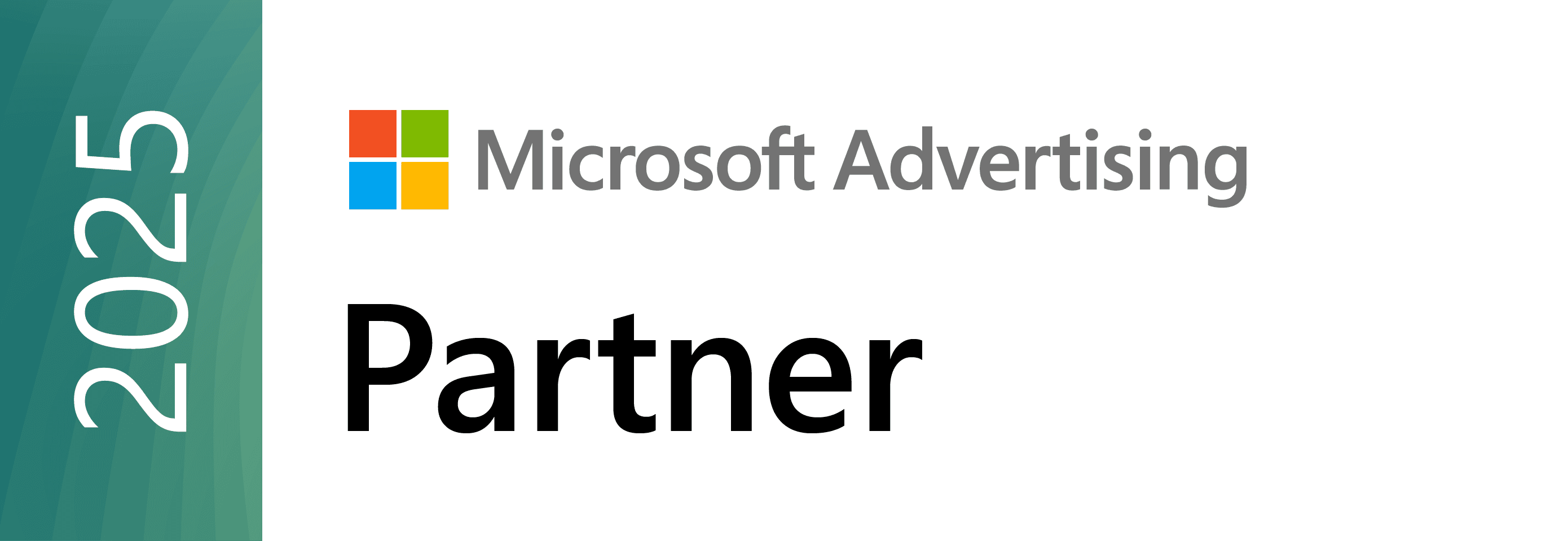





0 Comments